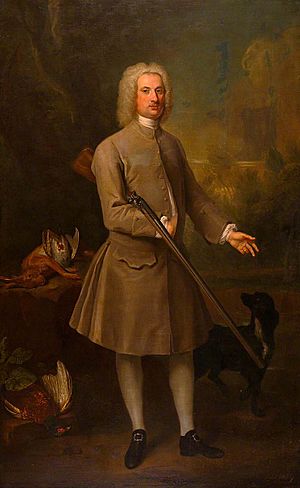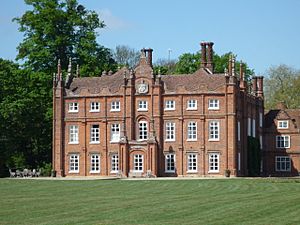Sir Charles Blois, 1st Baronet facts for kids
Quick facts for kids
Sir Charles Blois, 1st Baronet
|
|
|---|---|

Portrait of Sir Charles Blois by William Aikman
|
|
| Born | 14 September 1657 |
| Died | 9 April 1738 (aged 80) |
| Nationality | British |
| Occupation | Tory politician |
Sir Charles Blois, 1st Baronet (born September 14, 1657 – died April 9, 1738) was an important British politician. He belonged to the Tory political group. Sir Charles lived at Grundisburgh Hall and Cockfield Hall in Yoxford, Suffolk. He served as a Member of Parliament (MP) in the English House of Commons and later the House of Commons of Great Britain from 1695 to 1709. A Baronet is a special title, like a knight, that can be passed down in a family.
Early Life and Family
Charles Blois was born to Sir William Blois and his first wife, Martha Brooke. Sadly, Martha passed away very soon after Charles was born in 1657. His father, Sir William, then married Jane Barnardiston. Jane had been married before to Charles's uncle, John Brooke. Even though Jane was his stepmother, she was the only mother Charles ever knew.
A big change happened in 1669 when Charles's uncle, Robert Brooke, died in an accident. This meant Charles was set to inherit Cockfield Hall, a large family home.
In 1676, Charles's father, Sir William Blois, passed away. On May 11, 1680, Charles married Mary Kemp. She was the daughter of Sir Robert Kemp, 2nd Baronet.
Charles's grandmother, Elizabeth Brooke, who lived at Cockfield Hall, died in 1683. His aunt, Mary Brooke, who also had a claim to the estate, lived until 1693. Charles became a Baronet in 1686. After his aunt Mary died in 1693, Charles officially took over Cockfield Hall and made it his main home.
Charles also had a sister named Mary. She married Sir Nevill Catlin and later Sir Charles Turner.
Political Career
Charles Blois was very involved in local government and politics. In 1685, he became an Alderman for the town of Dunwich. An Alderman is like a city council member. That same year, he joined the group of people who kept the peace in Suffolk.
On April 15, 1686, he was given the special title of Baronet Blois. This title was connected to his family homes, Grundisburgh and Cockfield Hall.
In 1688, Charles helped check on fines for people who didn't follow certain religious rules in Cambridgeshire, Norfolk, and Suffolk. He was briefly removed from his role in Dunwich but was back by November 1688. He also helped with tax collection in Suffolk, Dunwich, and Ipswich.
Charles became a Member of Parliament (MP) for Ipswich in May 1689. This happened in a special election called a by-election. He was very active in the Parliament at that time, which was called the Convention Parliament. He was part of 36 different committees.
He was re-elected as MP for Ipswich in the 1690 English general election. As a Tory who supported the King, he continued to be very active in Parliament.
In 1693, Charles inherited the Yoxford estate from his aunt Mary Brooke. This gave him more influence in elections in the area of Dunwich. His first wife, Mary, passed away in 1693. In 1694, he married his second wife, Anne Hawtrey.
Charles lost the election in Ipswich in 1695 and did not run in 1698.
He was elected as MP for Dunwich in a by-election in January 1700. He was re-elected without anyone running against him in the general election of 1701. He was known for being against preparing for war with France. When he was re-elected again in 1701, he voted to support the actions of King William III's ministers.
Charles was re-elected without opposition in the 1702 election. He focused on local issues in Parliament. In 1704, he voted for something called the "Tack," which was a way to make sure money bills could not be changed by the House of Lords.
In the 1705 English general election, he was again unopposed in Dunwich. He voted against the King's preferred candidate for Speaker of the House.
In the 1708 British general election, there was a close election in Dunwich. Charles was elected, but he was later removed from his seat in February 1709 after a complaint. He did not run for Parliament again after that. He continued to serve as a bailiff (a local official) for Dunwich in 1708 and from 1711 to 1712. He was also likely a portman (another local official) in 1709.
Later Life and Legacy
Sir Charles Blois passed away on April 9, 1738, and was buried in Grundisburgh. He had three sons and one daughter with his first wife, Mary. Two of his sons died before him. His surviving son, Charles, became the 3rd Baronet after him.
With his second wife, Anne, he had two sons and one daughter. One of these sons also died before him. His other son, Ralph, later became the 4th Baronet.
 | William M. Jackson |
 | Juan E. Gilbert |
 | Neil deGrasse Tyson |


